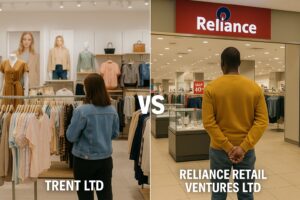Business Models & Strategic Positioning
Trent Ltd, a Tata Group company, operates through its multi-brand platforms including Westside, Zudio, and Star Bazaar (grocery). Its model leans heavily on in-house brands, vertical integration, and agile store rollouts. Westside targets urban, style-conscious middle-class consumers with private labels, while Zudio caters to value-focused mass-market shoppers in Tier 2–3 cities. This hybrid of mass and aspirational retail, built on private labels with full supply chain control, allows Trent to enjoy healthy margins and strong customer loyalty.
In contrast, Aditya Birla Fashion & Retail Ltd (ABFRL) adopts a brand aggregation strategy, operating marquee names like Pantaloons, Van Heusen, Allen Solly, and licensing partnerships with Forever 21, Reebok, and Sabyasachi Couture. ABFRL is focused on both value and luxury segments, positioning itself as a fashion conglomerate rather than a single-brand retail play. Its model depends more on partnerships and external brands than vertically integrated operations.
Shoppers Stop Ltd follows a department store model, relying on third-party national and international brands. With declining footfall in large format stores, it has shifted towards beauty and omnichannel enhancements. It remains a more urban, premium-positioned player, focusing on affluent metro-based consumers.
V-Mart Retail Ltd specializes in low-cost, small-town retail, offering affordable apparel and general merchandise in value-focused formats. After acquiring Unlimited from Arvind, it has tried to build scale but remains a predominantly discount/value player with tight operational budgets.
Future Lifestyle Fashions Ltd, formerly part of Kishore Biyani’s Future Group, is largely defunct and under insolvency proceedings after the collapse of its parent group. It operated brands like Central, Brand Factory, and Cover Story, and was once seen as a key mid-premium player. However, operational collapse and asset sales have left it largely inactive as of 2024.
Reliance Retail Ventures Ltd (RRVL), a subsidiary of Reliance Industries, is India’s largest retail conglomerate, straddling everything from fashion to grocery to electronics. Its fashion footprint includes Trends, Ajio, Azorte, Hamleys, Netmeds Fashion, and strategic stakes in couture brands like Ritu Kumar and Abu Jani-Sandeep Khosla. RRVL combines mass, premium, and luxury across both offline and online ecosystems, using scale, capital, and supply chain depth to dominate across price segments.
Financial Performance (FY24-25)
Trent Ltd posted stellar growth, with revenue nearing ₹11,000 crore and a market capitalization surpassing ₹1.75 lakh crore by mid-2025. The Zudio brand has driven significant expansion, contributing nearly half of store additions. Its EBITDA margins stood at an impressive 14–15%, aided by tight control over inventory, design-to-shelf cycles, and high private label penetration.
ABFRL, with revenues exceeding ₹12,000 crore, trails Trent in terms of market cap (around ₹35,000–40,000 crore), partly due to higher debt, thinner margins (EBITDA ~8–9%), and its capital-heavy luxury partnerships. However, its digital-first ventures like TMRW (D2C incubator) and strategic equity sales to GIC and Aditya Birla Capital provide liquidity and investor interest.
Shoppers Stop, although rebounding, remains a much smaller player (~₹4,000 crore revenue), with tighter margins and slower store additions. Its market cap hovers around ₹8,000–10,000 crore, and its digital pivot has only moderately compensated for declining in-store sales, especially post-pandemic.
V-Mart’s topline sits around ₹2,000 crore, and although its reach is wide (over 400 stores), its EBITDA margins are slimmer (~6–7%). The acquisition of Unlimited added debt and integration complexity, impacting short-term profitability.
Future Lifestyle Fashions is now a shell of its former self, with revenue dwindling, stores shuttered, and restructuring underway. The company is under IBC (Insolvency and Bankruptcy Code), and its stock is delisted or highly illiquid.
Reliance Retail Ventures is in a league of its own, with retail revenues over ₹2.6 lakh crore across all formats. Its fashion division alone rivals or exceeds the combined fashion sales of its competitors. With strategic funding from investors like KKR, Silver Lake, and QIA, and a valuation nearing ₹10 lakh crore, RRVL is the financial and operational Goliath of Indian retail.
Growth Strategies and Expansion Plans
Trent is pursuing aggressive Zudio store rollout, adding over 300 stores annually, and has now ventured into Zudio Men, and Zudio Home. Its focus remains on building regional clusters for better logistics and inventory optimization. Digital commerce is still nascent, as most growth is offline-led. A key differentiator is its weekly design refresh, mimicking fast-fashion models like Zara and H&M but tailored to Indian sensibilities.
ABFRL is betting on the premium and luxury wave, ramping up designer collaborations and expanding its D2C brand incubator. Its strategy involves diversification across price points, though execution has at times been hampered by brand complexity and debt servicing.
Shoppers Stop has prioritized beauty formats (SS Beauty), enhanced app experience, and premium store renovations to reclaim lost footfall. However, its traditional format remains under pressure from newer, trendier competition.
V-Mart is cautiously expanding into Tier 3–4 towns and aiming to improve tech infrastructure and merchandising. It faces stiff competition from D2C brands and low-cost fashion on e-commerce platforms.
Reliance Retail is investing in everything—from digital storefronts (Ajio) to premium boutiques (Azorte) to artisan supply chains. It is deploying AI for demand planning, experimenting with drone deliveries, and is aggressively buying up brands, stores, and logistics assets, cementing a pan-India omnichannel presence.
Competitive Strengths and Weaknesses
Trent’s key strength is its control over the full value chain—from design to shelf—which enables higher margins, agile inventory cycles, and faster market feedback loops. It avoids excessive discounting and maintains strong customer recall in urban and aspirational segments. However, it remains heavily reliant on physical expansion, with limited online revenue contribution and no significant presence in luxury or menswear-only segments.
ABFRL’s advantage lies in its brand depth and wide portfolio, but its capital-intensive partnerships and fragmented identity reduce brand synergy. Digital pivoting has been moderate, though recent equity infusions may give it the room for tech investments.
Shoppers Stop, while strong in beauty and metro-based loyalty, suffers from a dated store experience and low pricing power in its apparel business. Its beauty division, anchored by Estee Lauder and M.A.C, could become its biggest future asset.
V-Mart’s moat is affordability and rural familiarity, but with rising competition from ecommerce, scale without tech leverage could erode its margins. It also lacks a strong private label or aspirational value proposition.
RRVL’s strength is omnipresence, cash reserves, and supply chain scale. However, its operational complexity and lack of niche customer intimacy may limit traction in certain fashion verticals. Its ventures into luxury and D2C need better brand narratives to succeed beyond mass consumption.
Investor Profiles and Ownership
Trent Ltd is backed by the Tata Group (Westside: ~74%), with strong FII and mutual fund interest. Its conservative financials and consistent growth make it a favorite among institutional investors.
ABFRL is majority-owned by Aditya Birla Group, with recent investments by GIC (Singapore) and Aditya Birla Capital for specific verticals like TMRW and luxury partnerships.
Shoppers Stop is owned by K Raheja Corp, with minority public and institutional shareholding.
V-Mart remains promoter-led, with consistent FII participation due to its bottom-up growth story.
RRVL is privately held under Reliance Industries, with stakes sold to major global investors like KKR, Silver Lake, and QIA, though it’s yet to be publicly listed.




